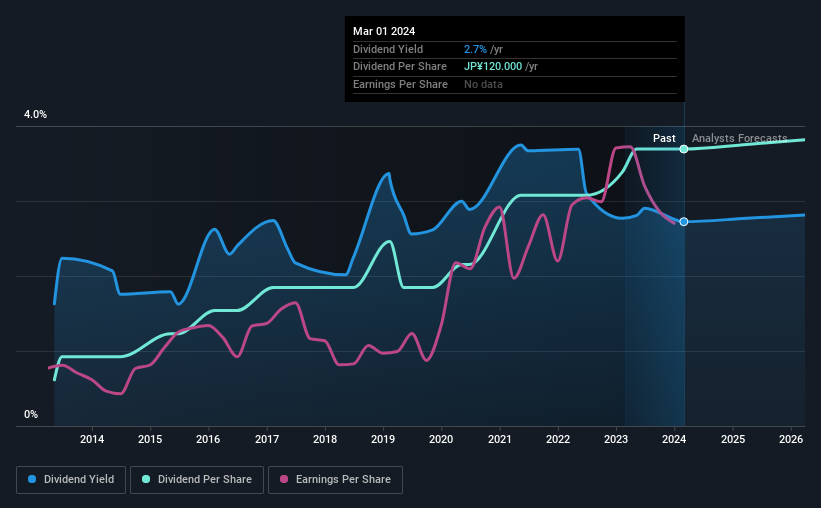- Japan
- /
- Construction
- /
- TSE:1968
Taihei Dengyo Kaisha's (TSE:1968) Upcoming Dividend Will Be Larger Than Last Year's

Taihei Dengyo Kaisha, Ltd. (TSE:1968) will increase its dividend on the 28th of June to ¥135.00, which is 13% higher than last year's payment from the same period of ¥120.00. The payment will take the dividend yield to 2.7%, which is in line with the average for the industry.
See our latest analysis for Taihei Dengyo Kaisha
Taihei Dengyo Kaisha's Payment Has Solid Earnings Coverage
Solid dividend yields are great, but they only really help us if the payment is sustainable. However, prior to this announcement, Taihei Dengyo Kaisha's dividend was comfortably covered by both cash flow and earnings. As a result, a large proportion of what it earned was being reinvested back into the business.
Over the next year, EPS is forecast to expand by 8.5%. If the dividend continues along recent trends, we estimate the payout ratio will be 35%, which is in the range that makes us comfortable with the sustainability of the dividend.

Dividend Volatility
The company has a long dividend track record, but it doesn't look great with cuts in the past. The dividend has gone from an annual total of ¥20.00 in 2014 to the most recent total annual payment of ¥120.00. This implies that the company grew its distributions at a yearly rate of about 20% over that duration. It is great to see strong growth in the dividend payments, but cuts are concerning as it may indicate the payout policy is too ambitious.
The Dividend Looks Likely To Grow
With a relatively unstable dividend, it's even more important to evaluate if earnings per share is growing, which could point to a growing dividend in the future. Taihei Dengyo Kaisha has seen EPS rising for the last five years, at 23% per annum. Rapid earnings growth and a low payout ratio suggest this company has been effectively reinvesting in its business. Should that continue, this company could have a bright future.
We Really Like Taihei Dengyo Kaisha's Dividend
In summary, it is always positive to see the dividend being increased, and we are particularly pleased with its overall sustainability. The company is easily earning enough to cover its dividend payments and it is great to see that these earnings are being translated into cash flow. Taking this all into consideration, this looks like it could be a good dividend opportunity.
Companies possessing a stable dividend policy will likely enjoy greater investor interest than those suffering from a more inconsistent approach. Meanwhile, despite the importance of dividend payments, they are not the only factors our readers should know when assessing a company. For instance, we've picked out 1 warning sign for Taihei Dengyo Kaisha that investors should take into consideration. Looking for more high-yielding dividend ideas? Try our collection of strong dividend payers.
Valuation is complex, but we're here to simplify it.
Discover if Taihei Dengyo Kaisha might be undervalued or overvalued with our detailed analysis, featuring fair value estimates, potential risks, dividends, insider trades, and its financial condition.
Access Free AnalysisHave feedback on this article? Concerned about the content? Get in touch with us directly. Alternatively, email editorial-team (at) simplywallst.com.
This article by Simply Wall St is general in nature. We provide commentary based on historical data and analyst forecasts only using an unbiased methodology and our articles are not intended to be financial advice. It does not constitute a recommendation to buy or sell any stock, and does not take account of your objectives, or your financial situation. We aim to bring you long-term focused analysis driven by fundamental data. Note that our analysis may not factor in the latest price-sensitive company announcements or qualitative material. Simply Wall St has no position in any stocks mentioned.
About TSE:1968
Taihei Dengyo Kaisha
Engages in the plant construction business in Japan and internationally.
Excellent balance sheet with proven track record.
Market Insights
Community Narratives



